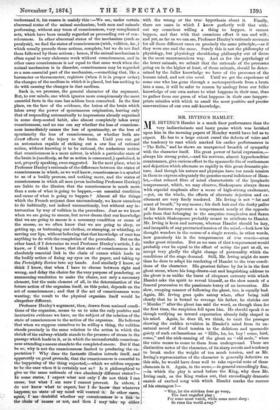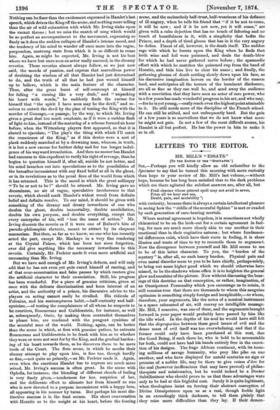MR. IRVING'S HAMLET 1VI R. IRVLNG'S Hamlet is a much finer
performance than the very indiscriminate and hasty praise which was lavished upon him in the morning papers of Monday would have led us to expect. He has to a large extent cured the defects of voice and the tendency to rant which marked his earlier performances in "The Bells," and he shows an unexpected breadth of sympathy with the character itself. His great power of facial expression,— always his strong point,—and his nervous, almost hypochondriac countenance, give curious effect to the spasmodic fits of restlessness and dejection which alternate so rapidly in this great dramatic pic- ture. And though his nature and physique have too much tension in them to express adequately the genuine moral indolence of Ham- let,—that relaxed fibre of mind characteristic of the lymphatic temperament, which, we may observe, Shakespeare always draws with especial emphasis after a scene of high-strung excitement, —yet, on the whole, the effects of alternate dejection and ex- citement are very finely rendered. Mr. Irving is not "fat and scant of breath," by any means ; his dark hair and the dusky pallor of his features represent a temperament nearly at the opposite pole from that belonging to the sanguine complexion and flaxen locks which Shakespeare probably meant to attribute to Hamlet. Mr. Irving is keen and nervous, whereas Hamlet should be lazy, and incapable of any protracted tension of the mind,—look how his thought wanders in the course of a single reverie, in other words, how genuinely his is the temperament of true reverie—even under great stimulus. But as no man of that temperament would probably ever be equal to the effort of acting the part at all, we accept very gladly the slight change of personality which the conditions of the stage demand. Still, Mr. Irving might do more than he does to adapt his rendering of Hamlet to the true condi- tions of the character. His greatest failure by far is in the first ghost scene, where his long-drawn-out and languishing address to the ghost is as unlike the burst of eloquent entreaty with which Hamlet asks the spirit to reveal himself, as the slow march of a funeral procession to the passionate hurry of an invocation. His slow, creeping manner of following the ghost, too, is equally bad. Again, Mr. Irving goes quite astray when, after being told clearly that he is bound to revenge his father, he shrieks out "Murder !" after the ghost has said the word, as though then for the first time, the suspicion fell upon him. He should speak it as though verifying an inward expectation already fully shaped in his mind. Again, he does ill, we think, to omit the passages showing the sudden revulsion in Hamlet's mind from its un- natural mood of fixed tension to the delirious and spasmodic gaiety of such exclamations as "Hub, ho, ho, boy ! come, bird, come," and the nick-naming of the ghost an "old mole," when the voice seems to come to them from underground. These are distinctive notes of the character, of its sharp recoils and tendency to break under the weight of too much tension, and as Mr. Irving's representation of the character is generally defective on this side, he would have done well to take especial note of these elements in it. Again, in the scene,—in general exceedingly fine, —in which the play is acted before the King, why does Mr. Irving omit, as the King rushes out, that exceedingly dramatic snatch of excited song with which Hamlet marks the success of his stratagem ?— " Why, let the stricken deer go weep,
The hart ungalled play ; For some must watch, while some must sloop:
So runs the world.away."
Nothing can be finer than the excitement expressed in Hamlet's last speech, which drives the King off the scene, and nothing more telling than the air of wild exhaustion with which Mr. Irving sinks upon the vacant throne ; but we miss the snatch of song which would be so perfect an accompaniment to the movement, expressing so
finely as it does the sudden collapse of Hamlet's intense mood, and
the tendency of his mind to wander off once more into the vague, purposeless, unstrung state from which it is so difficult to rouse him. Again, as might be expected, Mr. Irving is not his best where we have but once seen an actor really succeed, in the dreamy reveries. These reveries almost always follow, as we just now
said, the moods of passion, and express that marvellous power of doubting the wisdom of all that Hamlet had just determined to do, and the truth of all that he had just wound himself up to believe, which is the main feature of the character. Thus, after the great burst of self-contempt at himself for falling "a cursing like a very drab," and "unpacking his heart with words," he suddenly finds the excuse for himself that "the spirit I have seen may be the devil," and re- solves to outwit the devil by the plan of testing the King with the murder of Gonzago,—a passage, by the way, to which Mr. Irving gives a great deal too much emphasis, as if it were a sudden flash of light to him, instead of the maturing of a scheme formed ah hour before, when the Wittenberg players first appeared, so that it is absurd to ejaculate, "The play's the thing with which I'll catch the conscience of the King," as if this device were a sort of plank suddenly snatched at by a drowning man, whereas, in truth, it is but a new excuse for further delay and for the longer indul- gence of his wayward irresolution. And then no sooner has Hamlet had recourse to this expedient to verify his right of revenge, than he begins to question himself if, after all, suicide be not better, and his mind launches out into speculations as to the possibilities of the hereafter inconsistent with any fixed belief at all in the ghost, or in its revelations as to the penal fires of the world from which it has returned. This is the mood in which the great soliloquy "To be or not to be?" should be uttered. Mr. Irving gave no dreaminess, no air of vague, speculative incoherence to that reverie, which should mark Hamlet's widest recoil from definite belief and definite resolve. To our mind, it should be given with something of the dreamy and dreary inwardness of one who doubts the ghost, doubts immortality, doubts annihilation, doubts his own purpose, and doubts everything, except that every enterprise of his, will "lose the name of action." Mr. Irving descants the reverie as if it were one of Bulwer's bits of pseudo-philosophic rhetoric, meant to attract by its eloquent mannerism. But then, so far as we know, no one who has recently acted the part, except Mr. Mackaye in a very fine rendering at the Crystal Palace, which has been too soon forgotten, ever did give anything like the necessary inwardness to this reverie. Certainly, Mr. Fechter made it even more artificial and unmeaning than Mr. Irving.
But we have said enough of Mr. Irving's defects, and will only add that he has not even yet quite cured himself of ranting, and of that over-accentuation and false pauses by which ranters give the artificial character to their enunciation. Still, his progress has been wonderfuL For a piece of genuine criticism, given at once with the delicate discrimination and keen interest of an artist, and the authority of a prince, his discursive advice to the players on acting cannot easily be rivalled. His ridicule of Polonius, and his contemptuous habit,—half-curiosity and half- cynicism,—of testing the complaisance of all whom he suspects to be courtiers, Rosencranz and Guildenstein, for instance, as well as, subsequently, Osric, by making them contradict themselves to please him, are rendered with the pungent cynicism of the scornful man of the world. Nothing, again, can be better than the scene in which, at first with genuine pathos, he entreats Rosencranz and Guildenstein to be frank with him as to whether theywere or were not sent for by the King, and the gradual harden- ing of his heart towards them, as he discovers them to be mere tools of the Court. The flute scene, in which he mocks their clumsy attempt to play upon him, is fine too, though hardly so fine,—not quite so princely,—as Mr. Fechter made it. Again, even when the emotions Hamlet has to express are much more mixed, Mr. lrving's success is often great. In the scene with Ophelia, for instance, the blending of different chords of feeling is very finely given,—tenderness for her, suspicion of her, and the deliberate effort to alienate her from himself as one who is now devoted to a purpose inconsistent with a happy love, all appearing in his manner by turns. But perhaps his most dis- tinctive success is in the final scenes. His short conversation with Horatio as to the weight at his heart, before the fencing scene, and the melancholy half-trust, half-weariness of his defiance of ill-augury, when he tells his friend that "if it be not to come, it will be now ; and if it be not now, yet it will come," are given with a calm dejection that has no touch of faltering and no touch of boastfulness in it, with a simplicity that befits the Prince, and a depth of tired gloom that has in it the very augury he defies. Finest of all, however, is the death itself. The sudden rage with which he bursts upon the King when he finds that both wine and foil were poisoned, and deals the death-blow for which he had never gathered nerve before ; the spasmodic effort with which he snatches the poisoned cup from the hand of Horatio, and bids him live to clear his name ; and finally, the gathering glooms of death settling slowly down upon his face, as his discursive imagination hovers on the border of the unseen land, and anticipates all the terrors of the imminent disclosure, are all as fine as they can well be, and send away the audience with a conviction that they have seen an actor of rare power, who in a few years has made wonderful progress in his art, and who may, —for he is yet young,—easily reach even the highest point attainable in it. He still needs more of the discipline of the French school. He can still be stilted, and not unfrequently hard. But the gain of a few years is so marvellous that we do not know what more he might not gain. In not a few of the most difficult scenes, his Hamlet is all but perfect. He has the power in him to make it so in all.



































 Previous page
Previous page